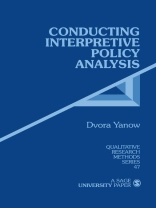This book in the QRM series is designed for a wide variety of research methods courses taught in various departments. It will be of most interest to those in Public Policy, Political Science, and Public Administration departments, but will also be of interest to researchers in Sociology, Anthropology, Communication and Education departments, among others. The book fills a gap in the traditional policy analysis coverage, which is usually heavily quantitative. It will also fill a gap in the QRM series in covering the discipline of political science, which is warming to qualitative methodology…slowly.
There has been much in the journal literature in the past 15 years calling for more interpretive approaches to the study of public policy; Yanow has been in the middle of it.
Mục lục
Underlying Assumptions of an Interpretive Approach
The Importance of Local Knowledge
Accessing Local Knowledge
Identifying Interpretive Communities and Policy Artifacts
Symbolic Language
Symbolic Objects
Symbolic Acts
Moving from Fieldwork and Deskwork to Textwork and Beyond
Giới thiệu về tác giả
I am interested in general in the communication of meaning in organizational and policy settings. Present research includes comparative immigrant and integration policies, Dutch race-ethnic category-making, reflective practice and practice studies, science museums and the idea of ′science, ′ and US Institutional Review Board and other research regulatory policies and practices.











